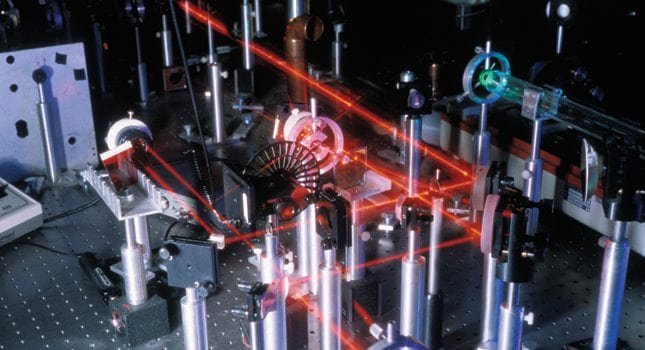
Higher Education Research Endeavors
Universities in New Jersey aim to keep talented researchers in the state, while collaborating with business and industry.
By Anthony Bucci, Assistant Editor On Jun 30, 2014Without research, one cannot understand and/or make vital decisions. Without research, companies cannot develop new products, ideas and technologies. Additionally, research is a critical element in the advancement of societies around the world.
In the United States, everyone from scientists to students are leading the way in fields of science, technology, engineering and mathematics (STEM). And, STEM research is reaching new heights, thanks to the vast array of high-quality work that is being conducted at colleges and universities, not only around the country, but right here in New Jersey.
“We have such a large and talented pool of people here in the state,” says Dr. Shreekanth Mandayam, vice president for research at Rowan University. “Keeping them here for innovative research endeavors, whether it is with a university, or a New Jersey-based company, is crucial.”
Mandayam’s sentiment is exactly what Rowan is striving to do in its new partnership with global security and aerospace company Lockheed Martin. The strategic partnership aims to develop new technologies for next generation radar systems in support of national defense. The collaboration expands on a previous existing relationship between the two entities as part of the Rowan College of Engineering clinic program that helps prepare students for the workplace.
The university’s new partnership with Lockheed focuses on R&D of technologies that will include components such as radar prototyping and analysis; system performance test and evaluation; radar engineering curriculums and educational program development; and supportability and sustainment innovation models.
“With this partnership, Lockheed will be involved in the development of a curriculum,” Mandayam says. “The company is essentially growing its future workforce and we are making sure students have jobs when they graduate. It is very unique for a university to include industry this closely in developing academic programs.”
The research activities for the program are taking place at Rowan’s South Jersey Technology Park in Mantua Township. As the program grows, the technology park will expand to accommodate additional companies and research.
“We are in the process of adding approximately 270,000 square feet of construction to our existing Samuel H. Jones Innovation Center, which has state-of-the-art equipment in it,” says Mandayam, who is also executive director of the university’s South Jersey Technology Park. “We have letters of intent from other prospective businesses that want to set up shop at the technology park and work with us. There is no doubt that more companies will follow suit in order to develop student researchers to fit their needs.”
Since becoming a public research university due to the Higher Education Restructuring Act in New Jersey in 2013, Rowan has set its sights on growing its sponsored research and grants from $24 million to $100 million by 2023.
“For us to be able to reach that goal, we have to partner with businesses like Lockheed Martin,” Mandayam says. “The kind of research we want to focus on is not just what our faculty wants to do, but what industry wants us to do, and that is a benefit of this program. We have the land, we have the ambition to build, we are hiring new faculty and are expanding the size of our engineering and business programs. We want research that is being developed in our labs to transition to the marketplace as products.”
One of the newest research-based endeavors at Kean University in Union is a program titled Project ASK: Applying Student Knowledge for Success in CS and IT. The National Science Foundation (NSF) awarded the university a grant of $621,925 to further develop a Scholarships-STEM program to increase the number of students in the computer science (CS) and information technology (IT) fields.
“There is a significant short fall of students entering the fields of CS and IT, not just in New Jersey but in the entire country,” says Dr. Patricia Morreale, chair of the computer science department at Kean and developer of Project ASK. “The NSF has identified the fact that there just aren’t going to be enough CS and IT graduates in the US, and Project ASK is a response to that.”
Morreale says that approximately 71 percent of new jobs in the next 10 years will be in CS and IT fields, and hopes that Project ASK will help introduce and keep undergraduate students engaged in those fields.
“This program will support research innovation that is vital to New Jersey and help meet national needs,” she says. “Students who have never been introduced to these fields in high school will have a chance to get involved with high-technology and state-of-the-art equipment along with projects like prototype systems, research papers and publications, and internships with different industries.
“New Jersey is rich with universities and we need students in specific areas to feed the state’s need to remain at the forefront of industry,” Morreale continues. “Companies like Verizon really like hiring our students and want to keep hiring locally because they know that it is good for the state and good for their business footprint. … So, we are building our capacity with our undergraduate research opportunities and are preparing our students to contribute strongly to the state.”
At the Newark-based New Jersey Institute of Technology (NJIT), the public research university recently introduced the New Jersey Innovation Institute (NJII), a non-profit corporation designed to aid local companies with research endeavors, and provide a new model for business innovation while creating a new source of income for the university. Five sector-focused innovation labs will comprise NJII. They include civil infrastructure, defense and homeland security, healthcare delivery systems, bio-pharmaceutical production and financial services. The labs will specialize in developing technological solutions to challenges identified by industry partners, as well as provide a broad range of related services identified by those partners.
“NJII will redefine the way universities engage with industries and create a capacity for innovation for product development, technology development and risk sharing that focuses on key industrial sectors,” says Dr. Donald H. Sebastian, president of NJII and senior vice president for research & development at NJIT. “We call it industry–led agenda. It is not about packaging or repackaging what we do at NJIT, but it’s about asking industry: ‘What are your problems and how can we help?’ These industries will come to us for help in mastering new/emerging technologies for the betterment of their sectors.”
In 2014, NJIT’s R&D expenditures will reach approximately $110 million, according to Sebastian. And, in addition to NJII, there is a countless amount of research happening at NJIT, of which Sebastian says he is excited to see to what the future holds.
“Ideas flourish and grow in an environment where you have everything from brilliant individuals, to people with practical skills, knowledge and supply chains to make and grow things,” he concludes. “What we are really trying to do is become a vital element in a New Jersey-based technological ecosystem. Not only are we encouraging individual research and innovation, but we are trying to bring companies together to be able to work on problems of mutual interest. We want to be a hub and a facilitator that makes these things happen. And, there is no better place for that than at NJIT, with NJII, and the state of New Jersey.”
Related Articles:





